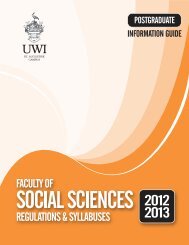Faculty of Humanities and Education (Postgraduate) - The University ...
Faculty of Humanities and Education (Postgraduate) - The University ...
Faculty of Humanities and Education (Postgraduate) - The University ...
You also want an ePaper? Increase the reach of your titles
YUMPU automatically turns print PDFs into web optimized ePapers that Google loves.
70<br />
POSTGRADUATE REGULATIONS & SYLLABUSES 2012 - 2013<br />
THE FACULTY OF HUMANITIES & EDUCATION<br />
Jenkins, K. (1995). On ‘What is history’: from Carr <strong>and</strong> Elton to<br />
Rorty <strong>and</strong> White. London: Routledge.<br />
Munslow, A. (2006). Deconstructing history. Second edition.<br />
London: Routledge.<br />
Phillips, I. (2008). Teaching history: developing as a reflective<br />
secondary teacher. Los Angeles: SAGE.<br />
Portal, Q.C. (Ed.). (1987). <strong>The</strong> history curriculum for teachers.<br />
London: Falmer Press.<br />
• Social Studies<br />
Bragaw, D. (1996). <strong>The</strong> social studies: the civic process. In<br />
Social Science <strong>Education</strong> Consortium. Teaching<br />
the social sciences <strong>and</strong> history in secondary schools:<br />
A methods book (pp.10-36). Long Grove, Illinois:<br />
Wavel<strong>and</strong> Press.<br />
Collins, P. (2004). (Ed.). Caribbean civilization: Course material.<br />
Barbados: U.W.I. (Distance <strong>Education</strong> Centre).<br />
Griffith, A., & Barth, J. (2006). Social studies curriculum <strong>and</strong><br />
methods for the Caribbean. Jamaica: U.W.I. Press.<br />
Honychurch, L. (2006). <strong>The</strong> Caribbean people 3. (3 rd ed.).<br />
Cheltenham: Nelson Thornes.<br />
Mohammed, J., & Keller, C. (2004). <strong>The</strong> Social studies for a<br />
postmodern age. Caribbean Curriculum, 11, 57-<br />
69.<br />
Mohammed, J., & Keller, C. (2009). <strong>The</strong> problem <strong>of</strong> generating<br />
a genuine social studies. Caribbean Curriculum,<br />
16(1), 57-70.<br />
Singleton, L. (1996). Teaching strategies. In Social Science<br />
<strong>Education</strong> Consortium. Teaching the social<br />
sciences <strong>and</strong> history in secondary schools: A<br />
methods book (pp.342-389). Long Grove, Illinois:<br />
Wavel<strong>and</strong> Press.<br />
Singleton, L. (1996). Using instructional materials. In Social<br />
Science <strong>Education</strong> Consortium. Teaching the<br />
social sciences <strong>and</strong> history in secondary schools: A<br />
methods book (pp. 390-407). Long Grove, Illinois:<br />
Wavel<strong>and</strong> Press.<br />
Singleton, L. (1996). Classroom assessment. In Social<br />
Science <strong>Education</strong> Consortium. Teaching the<br />
social sciences <strong>and</strong> history in secondary schools: A<br />
methods book (pp. 408 - 433). Long Grove, Illinois:<br />
Wavel<strong>and</strong> Press.<br />
Senesh, L. (1966). Organizing a curriculum around social<br />
science concepts. In I. Morrissett (Ed.), Concepts<br />
<strong>and</strong> Structure in the new social science curricula<br />
(pp. 21-38). New York: Holt, Rinehart <strong>and</strong> Winston.<br />
Sunal, C.S., & Haas, M.E. (2008). Social studies for the<br />
elementary <strong>and</strong> middle grades: A constructivist<br />
approach. (3 rd ed.). Boston: Pearson.<br />
Winch, P. (2008). <strong>The</strong> idea <strong>of</strong> a social science <strong>and</strong> its relation to<br />
philosophy. London: Routledge.<br />
• Caribbean Studies<br />
Mohammed, J. (2007). CAPE Caribbean Studies: An<br />
interdisciplinary approach. Oxford: MacMillan<br />
Caribbean.<br />
Hillman, R., & D’Agostino,T. (Eds.). (2003). Underst<strong>and</strong>ing the<br />
contemporary Caribbean. Kingston, Jamaica: Ian<br />
R<strong>and</strong>le.<br />
Barrow, C. (Ed.). (1998). Caribbean portraits: Essays on gender<br />
ideologies <strong>and</strong> identities. Kingston, Jamaica: Ian<br />
R<strong>and</strong>le.<br />
Moran, J. (2001). Interdisciplinarity: <strong>The</strong> new critical idiom.<br />
London: Routledge.<br />
Weingart, P., & Stehr, N. (Eds.). (2000). Practising<br />
interdisciplinary. Toronto: <strong>University</strong> <strong>of</strong> Toronto<br />
Press.<br />
Jacobs, H.H. (Ed.). (2004). Interdisciplinary curriculum: Design<br />
<strong>and</strong> implementation. Alex<strong>and</strong>ria, VA: Association<br />
for Supervision & Curriculum.<br />
• Sociology<br />
Mc Kinney, C., & Heyl, B. (2009). Sociology through active<br />
learning: Student exercises. Thous<strong>and</strong> Oaks, CA:<br />
Sage.<br />
Fowler, L. (2006). Introduction to sociology group activities<br />
workbook. Florence, KY: Wadsworth Publishing.<br />
Greenwood, N. (2011). First contact: Teaching <strong>and</strong> learning in<br />
introductory sociology. Lanham, MD: Rowl<strong>and</strong> <strong>and</strong><br />
Littlefield Publishers.<br />
• Geography<br />
Arends, R.I. (2004). Learning to teach. (6 th ed.). New York, NY:<br />
McGraw-Hill.<br />
Fien, J., Gerber, R., & Wilson, P. (Eds.). (1989). <strong>The</strong> geography<br />
teacher’s guide to the classroom. <strong>The</strong> Macmillan<br />
Co. <strong>of</strong> Australia.<br />
Graves, N.J., (1982). New UNESCO source book for geography<br />
teaching. Essex, UK: Longman, <strong>The</strong> UNESCO Press.<br />
Morgan, J.M., & Lambert, D. (2005). Geography: Teaching<br />
school subjects 11-19. Oxon, UK: Routledge.<br />
Sibley, S. (2003). Teaching <strong>and</strong> assessing skills in geography.<br />
Cambridge, UK: Cambridge <strong>University</strong> Press.<br />
(Endnotes)

















